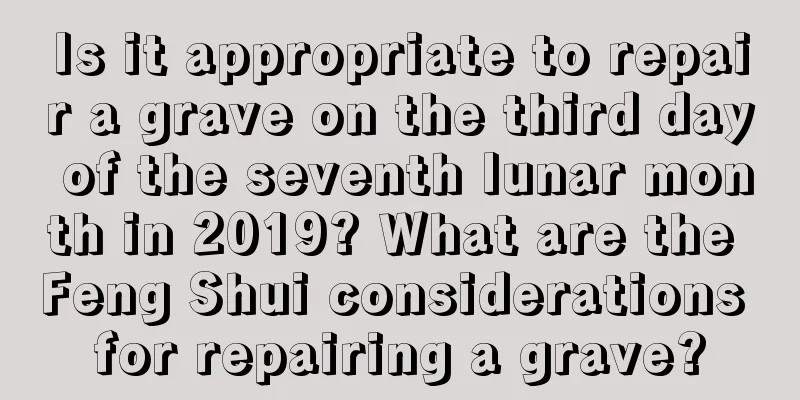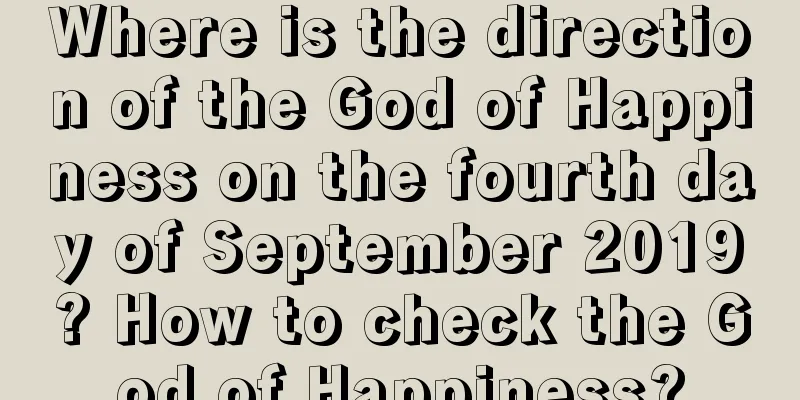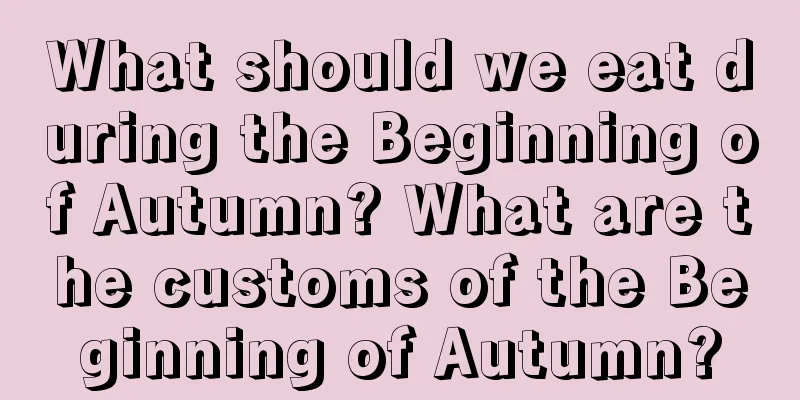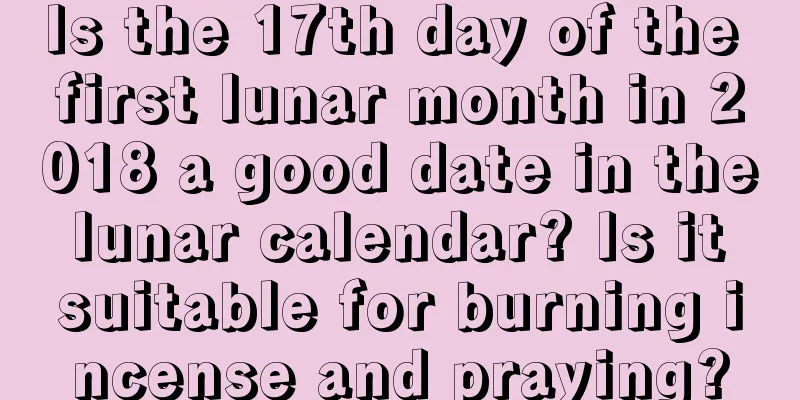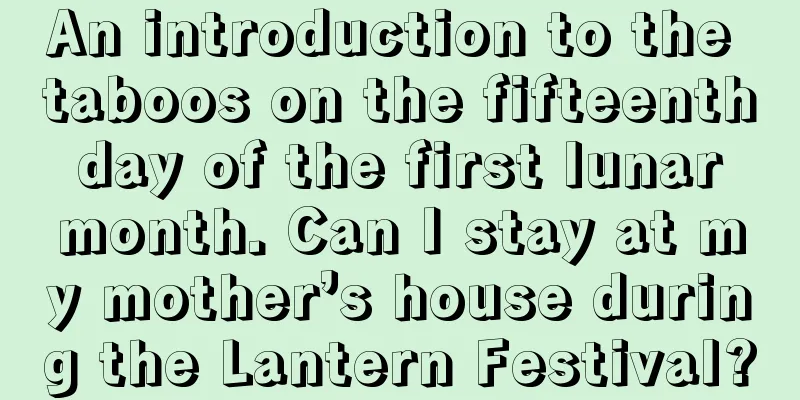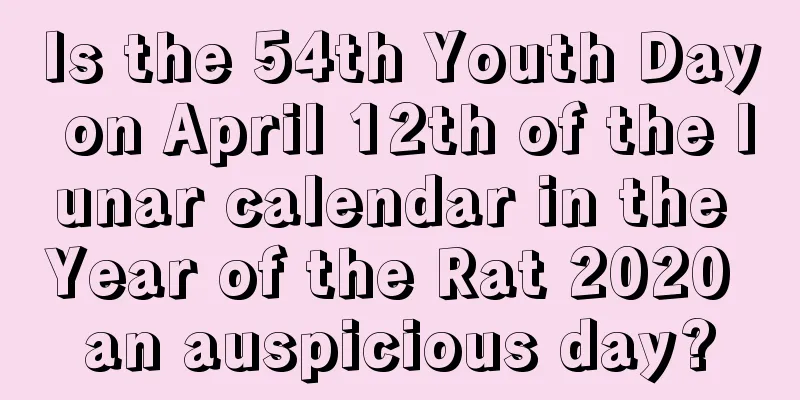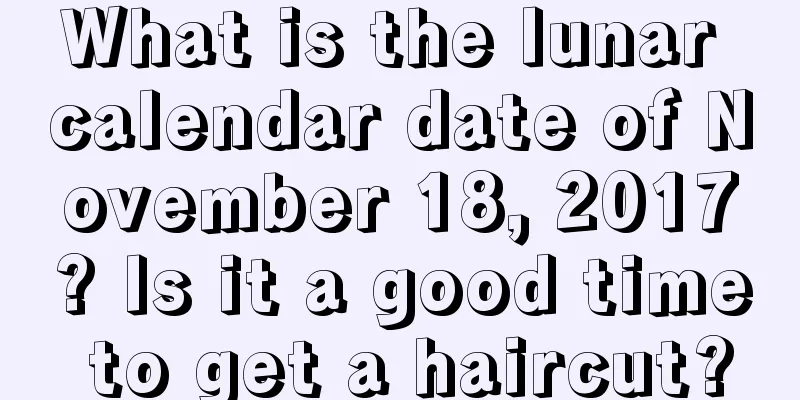When is the Winter Solstice (Little New Year) in 2019? Why is the Winter Solstice called "Little New Year"?
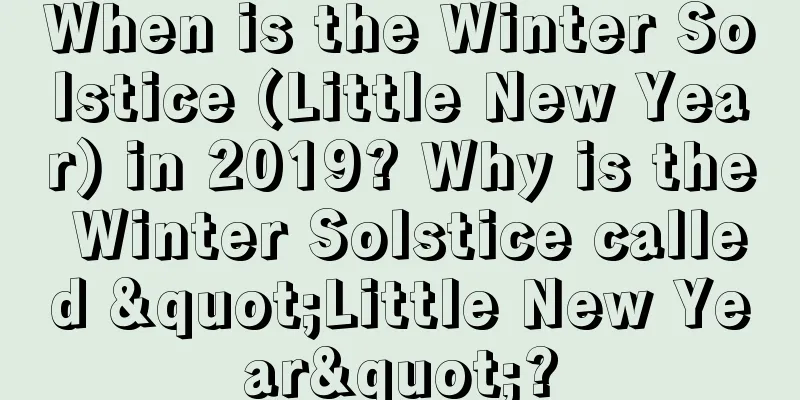
Introduction: The Winter Solstice is also called the "Little New Year" and is a festival that the people attach great importance to. So, when is the Winter Solstice (Little New Year) in 2019? Why is the Winter Solstice called "Little New Year"? Shui Mo Xiansheng website has carefully compiled detailed information about the eleventh month of the lunar calendar in 2019. If you want to know about the auspiciousness and inauspiciousness of the eleventh month of the lunar calendar, please come to Shui Mo Xiansheng website!When is the Winter Solstice (Little New Year) in 2019?Winter Solstice 2019: December 22 - the corresponding lunar date is the 27th day of November (Winter Month).Today's 28 Constellations: Good or Bad Luck The House Star creates farmland and land, and money, cattle and horses are everywhere. It also attracts farmland and houses in other places, bringing prosperity, wealth, happiness, and health. If this day is used for burials, high officials will be promoted to vassal states, and the king will be married to Chang'e in the Moon Palace, and after three years, the child will be brought to the court. Today's Hetu Luoshu Nine Stars Good and Bad Luck I will be Xianchi, which is not suitable for me. It will be unfavorable to go in and out, and there will be disasters due to the conflict. The innate Xun is southeast, the acquired Dui is due west, and gambling will waste land and wealth. Disasters will arise on the road to wealth, and you will retreat with a false alarm, and the wind will blow repeatedly against you. Ying Po Jun's place is called Su Sha Today's lunar calendar 12 gods determine good and bad luck: Holding majesty and power, he will encounter a great sage. He is known for his skill in catching thieves and violent men, but he is also known for his fear of being tied up. If it is combined with Baoyizhuanhaosu, it will be very auspicious and authoritative. Why is the Winter Solstice called "Little New Year"?Winter Solstice, also known as Winter Festival, Big Winter, Minor New Year, and Luchang Festival. The Huainanzi records: “Spring begins forty-six days after the winter solstice.In ancient times, people attached great importance to the Winter Solstice, which was called "the Second New Year", which was second only to the Chinese New Year. The winter solstice is also called "Little New Year", which means that the end of the year is approaching and there are not many days left. According to existing literature, celebration ceremonies have been held since the Han Dynasty. During the peak period, the imperial court would take a three-day holiday, the emperor would not attend government affairs, and the people would close their businesses for three days. The level of excitement in some parts of my country was no less than that of the Chinese New Year. The Book of Han said: "On the winter solstice, the yang energy rises and the emperor's reign is prolonged, so it is celebrated." People believed that after the winter solstice, the days would get longer and longer, and the yang energy would rise, marking the beginning of a solar term cycle and an auspicious day that should be celebrated. "Book of Jin" records that "On the winter solstice in the Wei and Jin dynasties, the emperor received congratulations from all countries and officials...the ceremony was second only to that of New Year's Day." This shows the importance of the winter solstice in ancient times. There is no written record of the custom of celebrating the Winter Solstice festival before the Han Dynasty. In the Han Dynasty, the winter solstice was regarded as the "Winter Festival". The government held a celebration ceremony called "Hedong". Officials took routine holidays and the custom of "Baidingdong" in which officials congratulated each other was popular among officials. The Book of the Later Han Dynasty recorded: "Around the winter solstice, gentlemen rest themselves and rest, officials stop working and do not attend to government affairs, and choose auspicious days to do things." So on this day, the court would take a day off, businesses would stop operating, relatives and friends would give each other delicious food and visit each other, happily spending a holiday of "resting and resting." During the Wei, Jin and Six Dynasties, the winter solstice was called "Yasui" and people would pay respects to their parents and elders. The Winter Festival flourished during the Tang and Song dynasties. After the Song Dynasty, the Winter Solstice gradually became a festival for worshiping ancestors and gods. During the winter solstice in the Ming and Qing dynasties, the emperor would hold a grand ceremony to worship heaven, which was called "Winter Solstice Ceremony to Heaven." During this period, people also have customs such as ancestor worship and family gatherings. Therefore, the winter solstice is called "Little New Year" . Different people have different destinies. As the saying goes, "A good fate is not as good as good luck." We cannot change our destiny, but we can change our fortune. Want to know your fortune in 2020? Then click on the [Premium Calculation] below to find out! |
Recommend
Is it good for a baby girl born on the ninth day of the Lunar New Year in 2018? What is her luck index?
Having a smooth life may not be a bad thing, but l...
What is the zodiac sign of a baby born on November 21, 2018 in the lunar calendar?
The orbit of the sun is called the ecliptic, which...
How is the fortune of people born in the Year of the Dog during the National Day in 2021? Detailed explanation of various aspects of fortune
The 12 zodiac signs have their own fortunes develo...
What is the fate of a boy born on May 18, 2020 - April 26?
A person's destiny is affected by the day of b...
Will the baby rat born in the Lesser Heat of 2020 have a strong life? The fortune of the 12 zodiac signs born in May of the lunar calendar!
Introduction: New life will be born during the Les...
Is Laba Festival 2020 a good day to pray for blessings? What are the hexagrams on Laba Festival?
Introduction: Generally, it is necessary to choose...
Are men born on the Beginning of Winter destined to be busy and toilsome? Are men born on the Beginning of Winter more emotional?
Introduction: Beginning of Winter is one of the 24...
Is it good to have a baby in the beginning of autumn in 2017? Will a child born in the Beginning of Autumn bring good luck to his parents?
Introduction: The Beginning of Autumn is one of th...
Is the tenth day of the fourth lunar month in 2022 an auspicious day to pick up a car? Can I pick up the car?
The pros and cons of choosing to pick up the car a...
Is the Winter Solstice in 2021 a good year? What is the direction of the God of Happiness in the Winter Solstice?
The winter solstice brings the cold winter. Where ...
Is the horoscope of a female rat baby born on the 19th day of the second lunar month in 2020, Arbor Day, strong?
Introduction: Although everyone cannot choose the ...
Is it appropriate to move house on May 21st of the lunar calendar in 2020?
Is it appropriate to move house on May 21st of th...
Can we offer sacrifices on May 11, 2020? Is July 1 the Party Founding Day?
Introduction: Generally, it is necessary to choose...
The Complete Collection of the Great Man Mao's True Feng Shui Stories (Part 1)
Introduction: As the saying goes: Times make heroe...
What are the five reds of the Dragon Boat Festival? Why do we eat five red foods during the Dragon Boat Festival?
The Dragon Boat Festival is one of the traditional...
